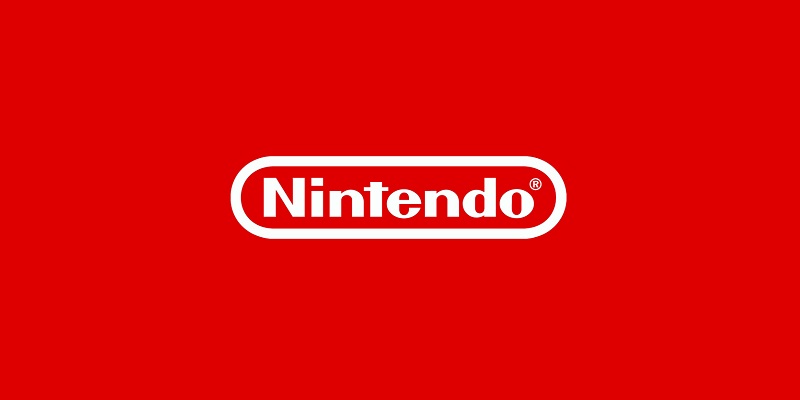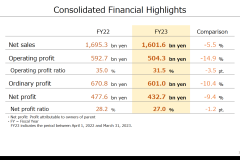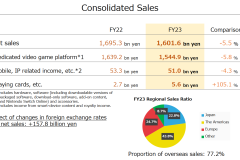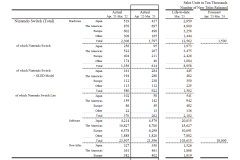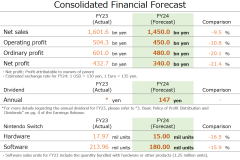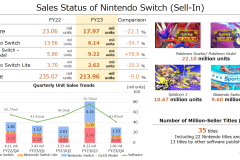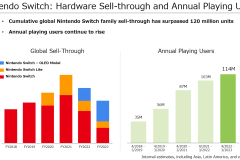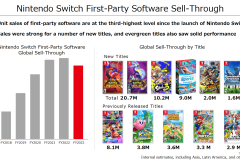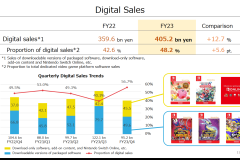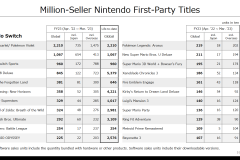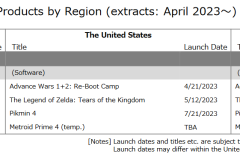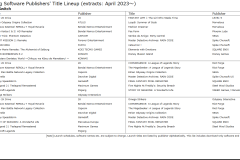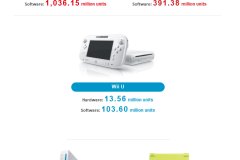Nintendo Financials (May 2023): results and highlights, Investors Briefing, Q&A
Nintendo Financials – Results
Nintendo have shared their latest financial results, covering the Fiscal Year Ended March 31st 2023 (April 1st 2022 to March 31st 2023). You will find all the details on these pages:
- Consolidated Financial Highlights, with consolidated operating results, the forecast for the current Fiscal Year, Nintendo comments, sales information (regional breakdown, digital sales), sales data and forecast, and more
- Financial Results Explanatory Material, with lots of additional sales data, list of million-sellers this Fiscal Year, release planning, and more
Some highlights:
- Pokémon Scarlet and Violet enjoyed good sales with 22.10 million units sold since launch (1.49 million units during Q4)
- Splatoon 3 sold 10.67 million units since launch (540 000 units during Q4)
- Nintendo Switch Sports sold 9.60 million units since launch (990 000 units during Q4)
- Mario Kart 8 Deluxe sold 8.45 million units during the past Fiscal Year (1.79 million units during Q4), and 53.79 million units since launch
- Kirby and the Forgotten Land sold 3.81 million units during the past Fiscal Year (370 000 units during Q4), and 6.46 million units since launch
- 34 games sold over 1 million units during the past Fiscal Year (including third-party titles)
- Hardware sales for Nintendo Switch dropped to 17.97 million units (-22.1% Year on Year) due to shortages of semiconductors until around the end of summer, and insufficient growth during the holiday season
- Software sales for Nintendo Switch dropped to 213.96 million units (-9% Year on Year), partially due to drop in Hardware sales
- Digital sales grew to 405.2 billion Yen (+12.7% Year on Year) thanks to strong performance of download version of retail games and revenue from Nintendo Switch Online subscriptions increasing
- Revenue from smart devices dropped, while royalty incoming increased, leading to a 4.3% drop Year on Year (51 billion Yen) for that category
Also, the following pages have also been updated:
- Dedicated Video Game Sales Unit: Hardware and Software sales for Nintendo consoles
Top Selling Title Sales Units: Top 10 Software for each platforms:
- Nintendo Switch [Updated]
- Nintendo 3DS [Updated]
- Wii U [Updated]
- Nintendo DS [Updated]
- Wii [Updated]
Nintendo Financials – Briefing
The Investor Briefing is now available: click here to check it out! Some highlights:
- one of the reasons for the drop in sales during the second half of 2022 (compared to 2021) is the launch of the OLED model in 2021, which boosted sales from October onwards
- the special OLED models that were launched in 2022 were bought not just by new users, but also existing users repacing their older model
- Unit sales of first-party software were at the third-highest level since the launch of Nintendo Switch, with strong sales for new games and solid sales for evergreen titles (though not at the same pace as before)
- Digital sales for the full year reached a record high. This was primarily due to the continuing weakness of the yen, though sales of retail games on the Nintendo eShop did increase.
Nintendo Financials – Q&A
The official English translation of the Q&A session from the latest Investor Briefing is now available: click here to check it out!
Here’s the list of questions:
Question 1: The Super Mario Bros. Movie is a big hit. What impact will that have on your strategy of expanding the number of people who have access to Nintendo IP? Do you expect non-game revenues to account for a greater percentage of total revenue in the future, or do you see this as one result of the IP expansion initiatives you have implemented to date?
Question 2: You have the stated goal of extending the lifecycle of Nintendo Switch. How much has your confidence in this goal increased at the present time? Do you feel that The Super Mario Bros. Movie can help extend the lifecycle even further? Also, although the movie’s box office revenues are included in the financial forecast for this fiscal year, am I correct in assuming that the positive ripple effects of the movie on the Nintendo Switch business have not been taken into account?
Question 3: Historically, annual operating profit has peaked at 500 to 600 billion yen, and cumulative hardware unit sales seem to hit a threshold at 140 to 160 million units. How do you plan to break that barrier? The Super Mario Bros. Movie has expanded the number of people who have access to Nintendo IP, but how will you connect this to even further market expansion and growth of your dedicated video game platform business?
Question 4: The number of annual playing users for Nintendo Switch is continuing to rise even as we enter its seventh year since launch, so from that perspective, I feel that it is possible to say that there is less of a need to release a next-generation platform. When you do release a next-generation platform, do you foresee a dramatic increase in the number of annual playing users, or will you maintain it at the level of at least 100 million users?
Question 5: My question is about hardware and software pricing. Material costs for hardware seem to be lower than they have been for a while. Is there a possibility of a price cut in the future? On the software side, The Legend of Zelda: Tears of the Kingdom is ten dollars more expensive (in the U.S.) than the previous title, The Legend of Zelda: Breath of the Wild. Could it be that development costs are on the rise? I’d like to hear your thoughts on future software pricing.
Question 6: Your forecast for this fiscal year shows that unit sales are expected to decrease by about 15% year-on-year for both hardware and software, and there will probably be additional negative effects on sales due to the appreciation of the yen. Yet, full-year sales are expected to decline by 9.5% year-on-year, which is a narrower rate of decline. What kinds of positive impact on sales are you anticipating?
Question 7: Nintendo Switch was announced under the development codename “NX” in March 2015, and then the official name was announced in October 2016 prior to its launch in March 2017. Looking back, do you consider this a success in terms of hardware marketing, given there was a space of about two years between the initial announcement and launch? Do you think a similar interval between the announcement and launch of a next-generation platform will be necessary?

